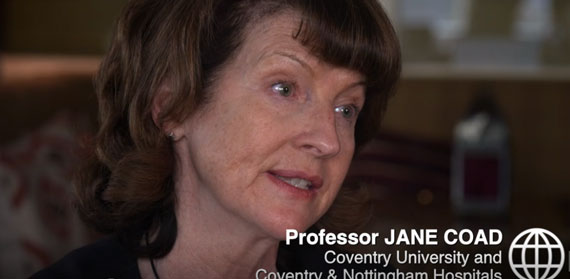Guest post by Professor Jane Coad, Centre for Innovative Research Across the Life Course
BBC Panorama’s programme Fighting For My Child will have been an emotional and eye-opening watch for many television viewers. But more importantly I hope it will help lead to changes in how families of children with complex health needs are supported.
The documentary focussed on three extraordinary families who spend their lives caring for children with serious disabilities and I was honoured to be interviewed as part of the programme and to meet some of these dedicated and loving parents. The needs of these children is of paramount importance, but this sensitively-handled programme has given the families themselves a voice to say to the government and healthcare providers that things have to change.
The programme, broadcast on BBC One on Monday 16 July, said an estimated one million children with complex needs live at home with their families. It is a number that has doubled since 2004. This is now a significant group who have a very unique and diverse range of needs. These families need a lot of support; equipment, product and nutritional support. A critical requirement is respite. But as the number of families in this situation is growing, it appears that government funding is significantly reducing. This has affected families’ ability to get the help they need, puts both financial and emotional pressure on them and can lead to stress and declining mental health. This then has a societal impact.
I have worked with children and young people and their families with complex and life limiting illnesses for over 25 years. For me, it is not about the number of children who have complex needs, but about the quality of life for that child and the family.
Understanding their journey – from diagnosis, communication, service needs and provision, psychosocial needs, family support including siblings, and care pathways – these are all more pressing issues to me. Much of this care takes place at home, where families often receive nursing care support. This support can vary from 24 hours a day to a few nights per week with trained healthcare support workers, according to research.
And in Panorama programme I stressed the importance of respite care and the opportunities for families having a break. It can make such a difference to their physical and emotional well-being, especially if the nursing support they receive is limited.
Another of the noticeable elements from the programme was that the majority of the children were being fed through tubes. The UK’s current nutritional guidance doesn’t recommend the use of blended natural foods. Instead it recommends the use of prescribed commercial formulas. This is a topic I feel strongly about and have carried out research on it, involving colleagues at Coventry University and from both University Hospital Coventry & Warwickshire and University Hospital Nottingham, where I am also a clinical professor of nursing.
Our aim is to influence change to current policy in the UK. As you saw from the programme, having meal times together with all the children is a very important factor in family life. It gives parents a feeling of some control over the development of their child’s health and life. As well as research into increasing technology including blended diets, my focus for the past 12 years has been on influencing policy change in the provision of palliative care services.
This was taken up in NICE guidelines and published by Together for Short Lives, a leading UK charity for children with life-threatening & life-limiting conditions. My research also involves exploring the skills and knowledge professionals need to care for the growing needs of this group. These are all important areas which are vital to explore further to ensure children with complex health needs and their families have an improved quality of life. We know the government is pumping funds into tackling an ageing population. But the increasing survival of children with serious disabilities should most definitely form part of that agenda.
In future years we will have ageing parents looking after their children with complex needs, at home, for much longer. The government should be widening its strategy around societal challenges in ageing, to include these children with complex health needs. Panorama has provided us with a platform which I hope will enable us to take this debate to parliament where we can openly discuss the care required for the children and the choices parents are given. I hope it will help encourage open communication with healthcare professionals and families, so each can begin to better work together and most importantly, so we can help improve the quality of life for these children and their families.
Watch the programme on BBC iPlayer: https://www.bbc.co.uk/iplayer/episode/b0bc2ch6/panorama-fighting-for-my-child





Comments are disabled